

Digital mobilization and censorship in the Asia Pacific. There is great variability in the usage of information communication technology (ICT) between Asia Pacific states from those with almost no adoption to ubiquity in others.
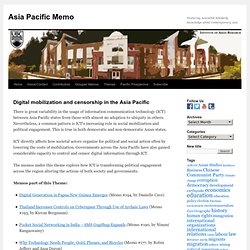
Nevertheless, a common pattern is ICT’s increasing role in social mobilization and political engagement. This is true in both democratic and non-democratic Asian states. ICT directly affects how societal actors organize for political and social action often by lowering the costs of mobilization. Governments across the Asia Pacific have also gained considerable capacity to control and censor digital information through ICT. The memos under this theme explore how ICT is transforming political engagement across the region altering the actions of both society and governments. Memos part of this Theme: Mobile phones have been a gift for development, says Jeffrey Sachs. Tulsi Prasad, an Indian slum dweller, makes a call in Kolkata, east India.
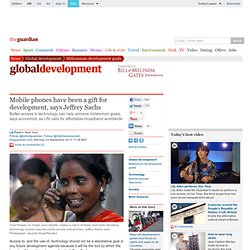
Boosting technology access requires public-private partnerships, Jeffrey Sachs says. Photograph: Jayanta Shaw/Reuters Access to, and the use of, technology should not be a standalone goal in any future development agenda because it will be the tool by which the targets will be achieved, according to Jeffrey Sachs. Speaking at a roundtable event at the Social Good Summit in New York on Sunday, the director of the Earth Institute at Colombia University said: "The goals depend on technology … This is technology for solving problems, not in itself.
" On the eve of the UN general assembly's three-day focus on the millennium development goals (MDGs) and their successors, Sachs claimed technology, specifically mobile phones, had been a gift for development. The UN secretary-general, Ban Ki-moon, said at the launch of the report: "As the world becomes increasingly digital, simple connectivity is no longer enough. Eyeing New Press Freedoms Next Door, China's Netizens Develop 'Myanmar Envy' National League for Democracy supporters cheer as they parade ahead of the parliamentary elections in Yangon, Myanmar on March 30, 2012.
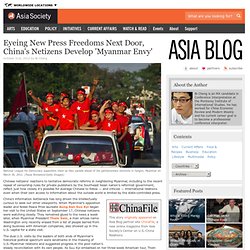
(Paula Bronstein/Getty Images) Chinese netizens' reactions to tentative democratic reforms in neighboring Myanmar, including to the recent repeal of censorship rules for private publishers by the Southeast Asian nation's reformist government, reflect just how closely it's possible for average Chinese to follow — and criticize — international relations even when their own access to information about the outside world is limited by the state-controlled press. This story originally appeared on Asia Blog partner site ChinaFile, a new online magazine from Asia Society's Center on U.S. -China Relations. China’s information bottleneck has long driven the intellectually curious to seek out other viewpoints. Mobile phones have been a gift for development, says Jeffrey Sachs.
Broadband 'can boost household income' Basic broadband can add £200 a month to household income in developed economies, researchers have found, because better internet access improves learning and working from home.
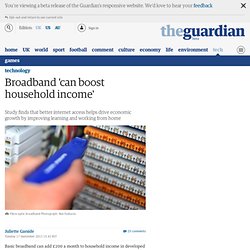
Increasing download speeds from a weak 0.5 megabits per second to a basic 4Mbps – enough to reliably stream video – makes a statistically significant difference to a family's earnings, a study by telecoms equipment firm Ericsson has found. "If you have a good broadband connection you can enjoy online learning services from the most prestigious universities around the world, you can be a better informed consumer, you make better purchases at the best price," said Sebastian Tolstoy, a vice-president at Ericsson. "As a better-connected professional you are likely to be more attractive at work and that could translate into being more successful in your career.
" For households which go from no internet access to 4Mbps, earnings can rise by £1,320 a year. Press Freedom Index 2013. Download the reportDownload the 2013 world press freedom mapRead in Arabic (بالعربية)Read in Turkish (Türkçe)Read in Italian (Italiano)Read in German (Deutsch)Read in Chinese (看中文) After the “Arab springs” and other protest movements that prompted many rises and falls in last year’s index, the 2013 Reporters Without Borders World Press Freedom Index marks a return to a more usual configuration.

The ranking of most countries is no longer attributable to dramatic political developments. This year’s index is a better reflection of the attitudes and intentions of governments towards media freedom in the medium or long term. The same three European countries that headed the index last year hold the top three positions again this year. Www.freedomhouse.org/sites/default/files/resources/FOTN 2012 - Full Report_0.pdf. Banyan: Against the tide. Media Censorship in China. Introduction The Chinese government has long kept tight reins on both traditional and new media to avoid potential subversion of its authority.
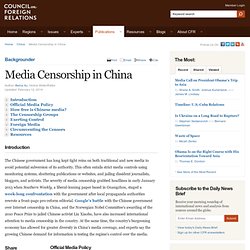
This often entails strict media controls using monitoring systems, shuttering publications or websites, and jailing dissident journalists, bloggers, and activists. The severity of media censorship grabbed headlines in early January 2013 when Southern Weekly, a liberal-leaning paper based in Guangzhou, staged a week-long confrontation with the government after local propaganda authorities rewrote a front-page pro-reform editorial. Google's battle with the Chinese government over Internet censorship in China, and the Norwegian Nobel Committee's awarding of the 2010 Peace Prize to jailed Chinese activist Liu Xiaobo, have also increased international attention to media censorship in the country.
Official Media Policy A stack of liberal magazine Southern Weekly on display at a newsstand in Changzhou, Jiangsu province.